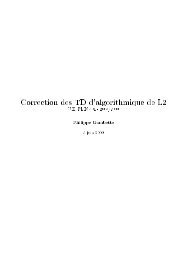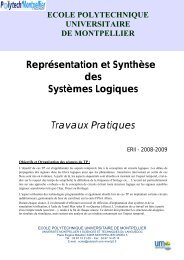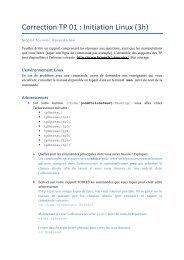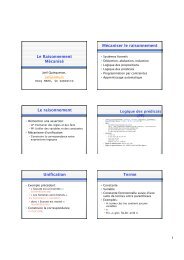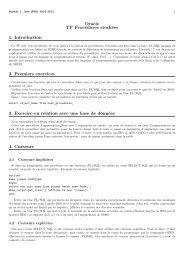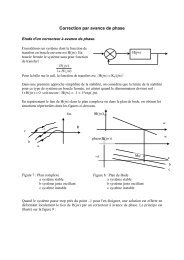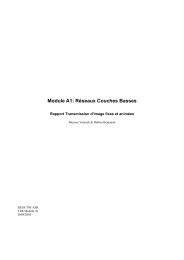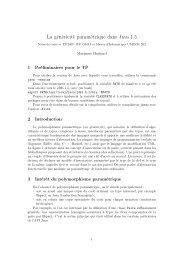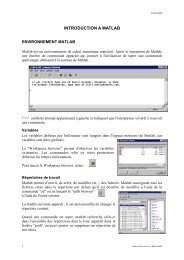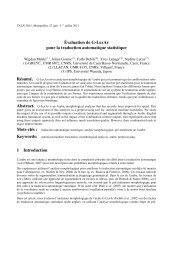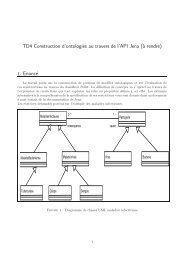Evaluating User Experience in Games: Concepts and Methods - Lirmm
Evaluating User Experience in Games: Concepts and Methods - Lirmm
Evaluating User Experience in Games: Concepts and Methods - Lirmm
Create successful ePaper yourself
Turn your PDF publications into a flip-book with our unique Google optimized e-Paper software.
214 M. Brown et al.<br />
Another important issue of game controller functionality is the level of support<br />
for the controller <strong>in</strong> a given game. A controller with a wide range of possible <strong>in</strong>puts<br />
<strong>and</strong> outputs is of little benefit if game software does not support it. Assess<strong>in</strong>g controller<br />
functionality <strong>in</strong> isolation from software is fairly straightforward, as the range<br />
<strong>and</strong> sensitivity of various <strong>in</strong>puts <strong>and</strong> outputs can be easily tested. However, relat<strong>in</strong>g<br />
this to <strong>in</strong>-game functionality is a more complex issue, as the range <strong>and</strong> sensitivity of<br />
a controller may not be supported or necessary for a given game.<br />
12.3.3 Usability <strong>and</strong> Game Controllers<br />
A classic description of usability is “The extent to which a product can be used by<br />
specified users to achieve specified goals with effectiveness, efficiency <strong>and</strong> satisfaction<br />
<strong>in</strong> a specified context of use” (ISO 1998a). This def<strong>in</strong>ition highlights four core<br />
concepts central to <strong>in</strong>teraction: effectiveness, efficiency, satisfaction, <strong>and</strong> context of<br />
use. Each of these concepts is important when discuss<strong>in</strong>g game controller design.<br />
Effectiveness describes the ability of the user to complete specific tasks with<br />
the technology. This goes further than basic functionality, as not only must the<br />
technology have the potential to perform tasks, the user must also be able to operate<br />
the technology sufficiently to actually complete these tasks. The importance<br />
of effectiveness <strong>in</strong> game controller design is obvious: If users cannot use a controller<br />
to perform game tasks, they will be unable to <strong>in</strong>teract with the game <strong>in</strong> any<br />
mean<strong>in</strong>gful way.<br />
The importance of efficiency <strong>in</strong> game controller design is a more complex issue.<br />
Efficiency considers the resources that must be expended by the user to complete<br />
tasks. These resources can be mental effort, physical effort, or time. In terms of<br />
computer games, this is closely l<strong>in</strong>ked to concept of difficulty: i.e., if a game requires<br />
a large amount of resources (time, skill, mental effort, etc.), then it is described as<br />
difficult <strong>and</strong>, conversely, if it requires few resources, it is described as easy. This<br />
might seem to be of limited importance when discuss<strong>in</strong>g game controllers, as the<br />
ma<strong>in</strong> focus of games is to enjoy play<strong>in</strong>g them, not to effectively complete tasks.<br />
However, as Csikszentmihalyi (1975) reports, complet<strong>in</strong>g tasks that are easy can<br />
become bor<strong>in</strong>g <strong>and</strong> tasks that are difficult can become frustrat<strong>in</strong>g. This need for<br />
balance of effectiveness presents a dilemma <strong>in</strong> game controller design.<br />
The concept of satisfaction deals with how the <strong>in</strong>teraction impacts the user; are<br />
they free from discomfort <strong>and</strong> do they have a positive attitude toward the <strong>in</strong>teractions?<br />
Once aga<strong>in</strong> the importance of this concept to game controller design is fairly<br />
obvious, as play<strong>in</strong>g computer games is an enterta<strong>in</strong>ment-driven activity, <strong>and</strong> the<br />
<strong>in</strong>teraction should be satisfy<strong>in</strong>g. Unlike efficiency, effectiveness, <strong>and</strong> context of use,<br />
satisfaction is purely subjective. While the other core concepts of usability can to<br />
some degree be directly observed, satisfaction must be assessed solely on the basis<br />
of user feedback. This can cause problems <strong>in</strong> game controller design, as variables<br />
such as context of use can <strong>in</strong>fluence user report <strong>and</strong> distort f<strong>in</strong>d<strong>in</strong>gs.<br />
Context of use is unlike the other concepts discussed as it is not a vital part of<br />
usability, but is a factor that must be considered when study<strong>in</strong>g efficiency, effectiveness,<br />
<strong>and</strong> satisfaction. Basically, context of use describes the situation <strong>in</strong> which an




